
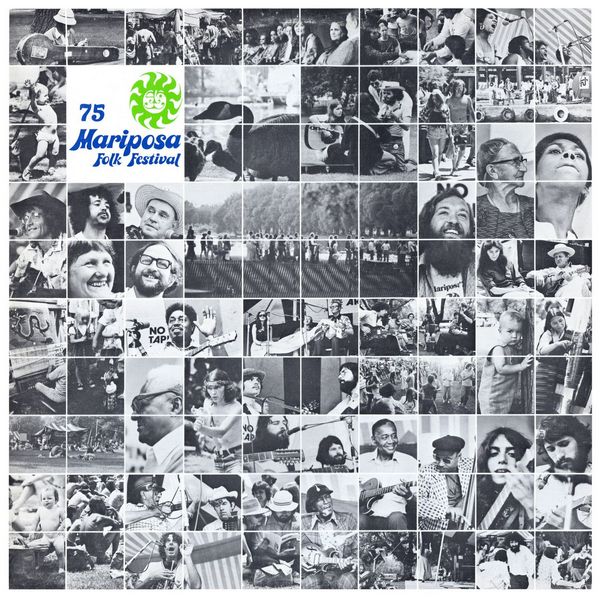 |
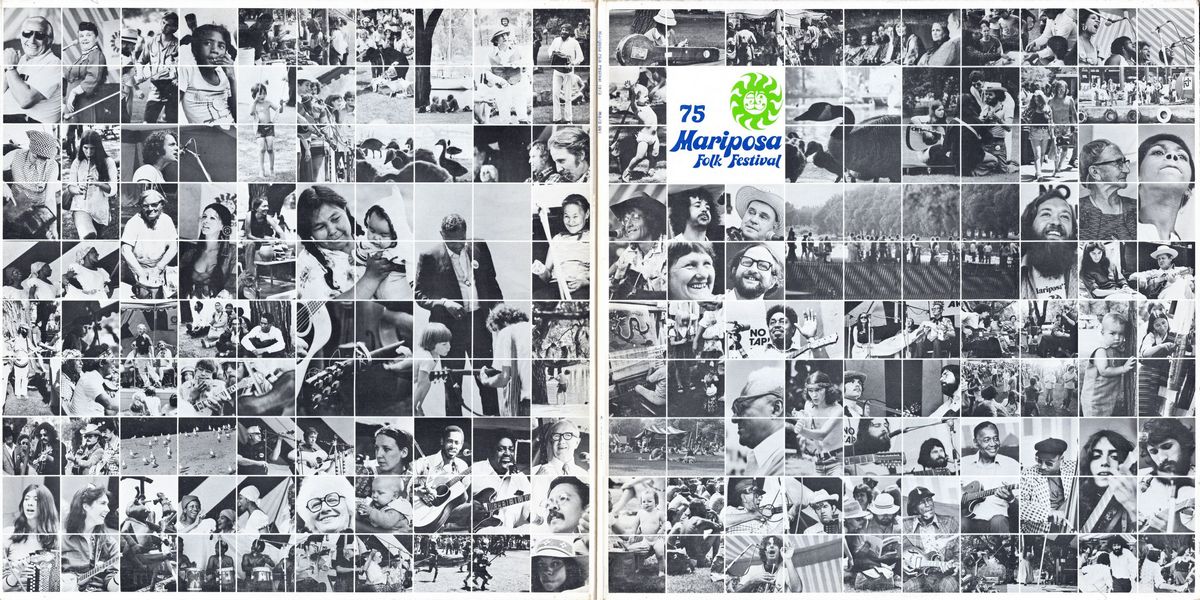
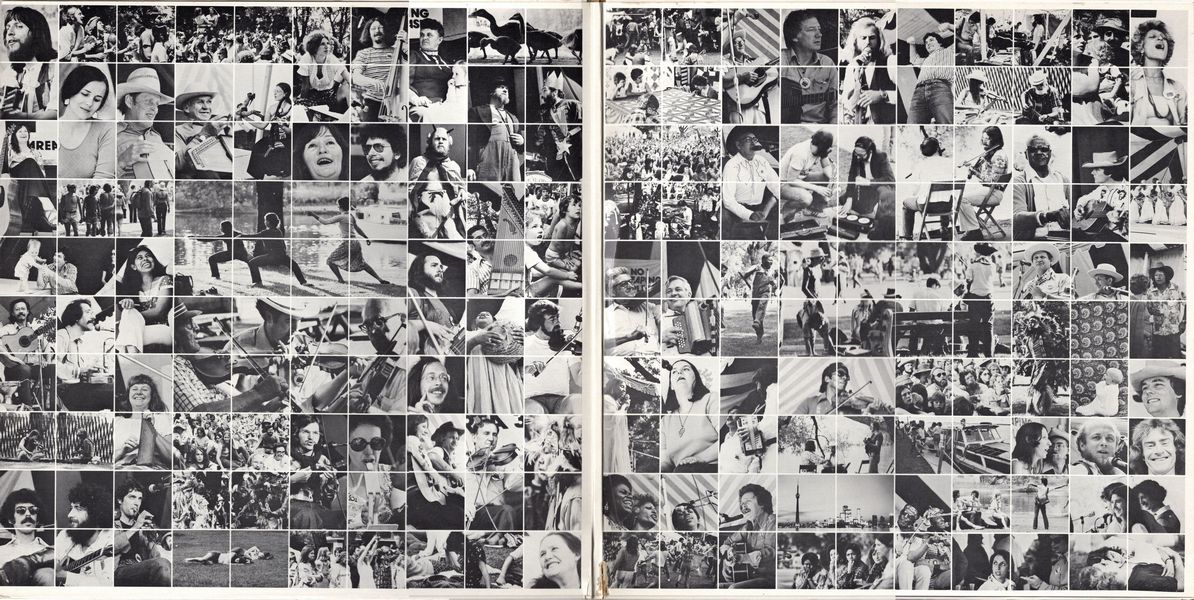 |
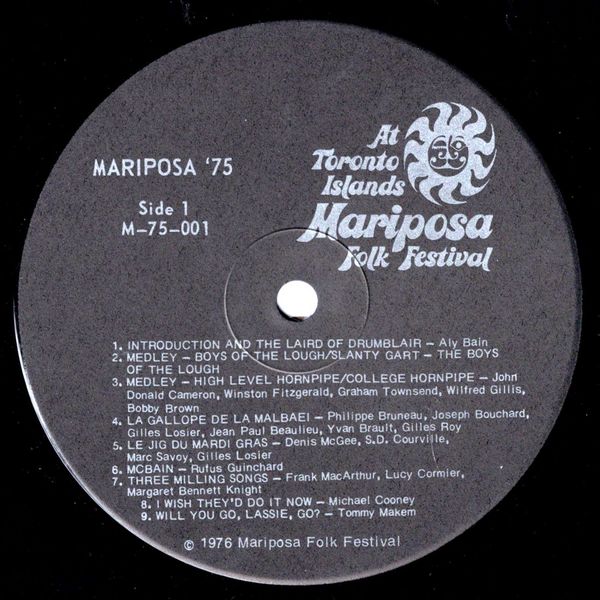
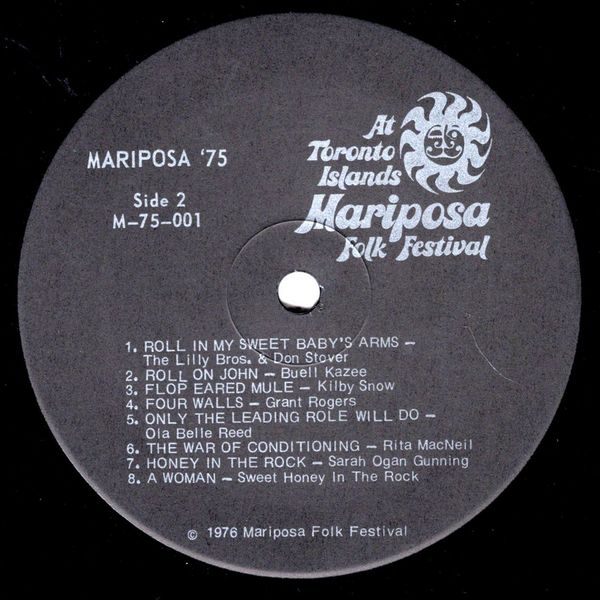
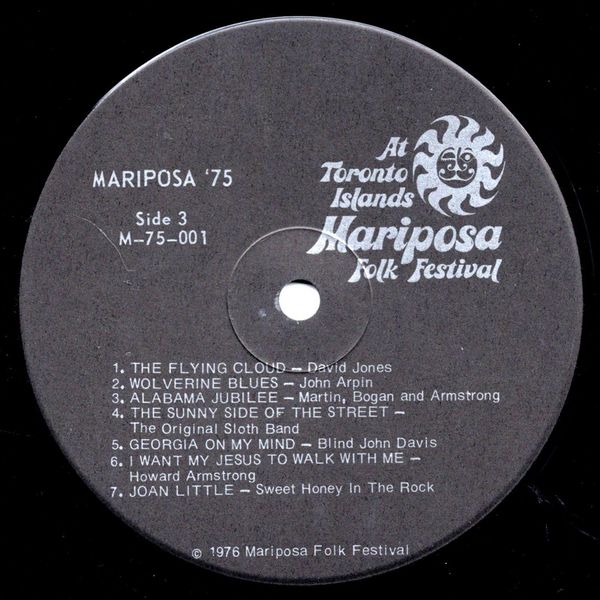
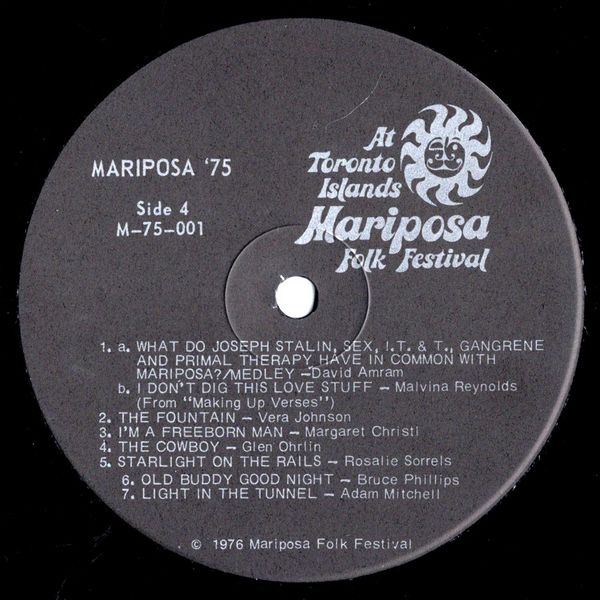 |
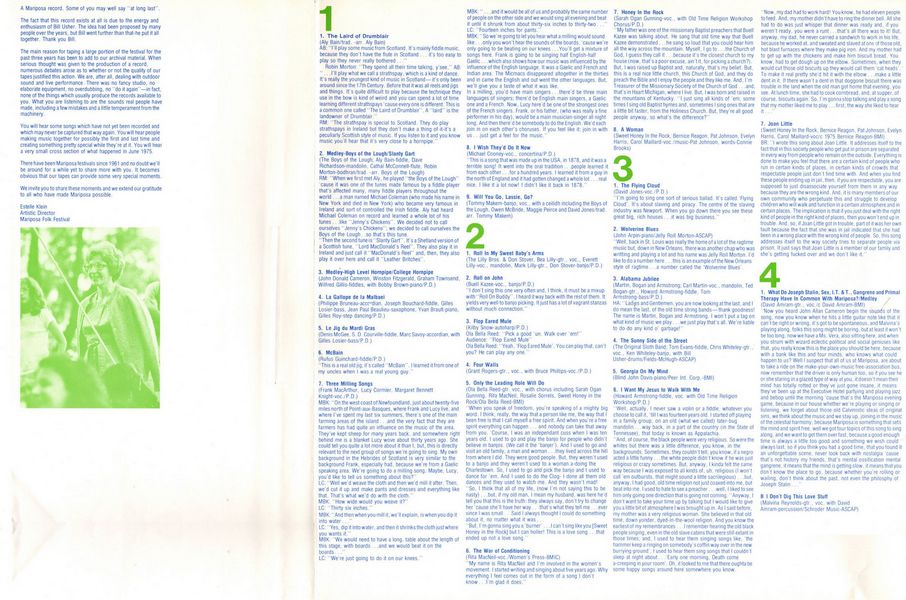
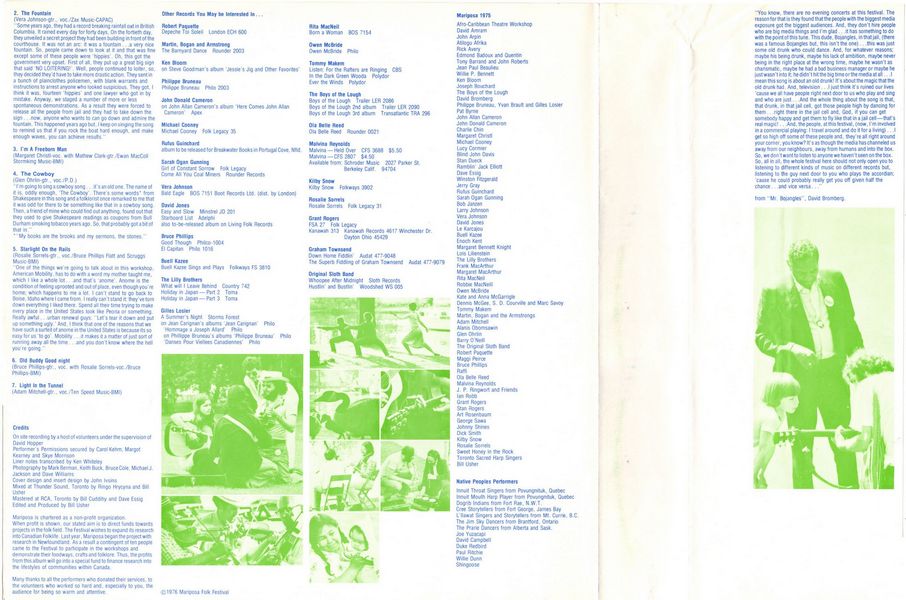
|
Sleeve Notes
A Mariposa record. Some of you may well say "at long last".
The fact that this record exists at all is due to the energy and enthusiasm of Bill Usher. The idea had been proposed by many people over the years, but Bill went further than that — he put it all together. Thank you Bill.
The main reason for taping a large portion of the festival for the past three years has been to add to our archival material. When serious thought was given to the production of a record, numerous debates arose as to whether or not the quality of our tapes justified this action. We are, after all, dealing with outdoor sound and live performance. There was no fancy studio, no elaborate equipment, no overdubbing, no "do it again" — in fact, none of the things which usually produce the records available to you. What you are listening to are the sounds real people have made, including a few mistakes and a little temperament from the machinery.
You will hear some songs which have not yet been recorded and which may never be captured that way again. You will hear people making music together for possibly the first and last time and creating something pretty special while they're at it. You will hear a very small cross section of what happened in June 1975.
There have been Mariposa festivals since 1961 and no doubt we'll be around for a while yet to share more with you. It becomes obvious that our tapes can provide some very special moments.
We invite you to share these moments and we extend our gratitude to all who have made Mariposa possible.
Estelle Klein
Artistic Director
Mariposa Folk Festival
"You know, there are no evening concerts at this festival. The reason for that is they found that the people with the biggest media exposure got the biggest audiences. And, they don't hire people who are big media things and I'm glad … it has something to do with the point of this tune. This dude, Bojangles, in that jail, (there was a famous Bojangles but, this isn't the one) … this was just some old drunk who could dance. And, for whatever reasons; maybe his being drunk, maybe his lack of ambition, maybe never being in the right place at the wrong time, maybe he wasn't as charismatic, maybe he had a bad business manager or maybe he just wasn't into it; he didn't hit the big time or the media at all … I mean this song is about an old drunk! It's about the magic that the old drunk had. And, television … I just think it's ruined our lives 'cause we all have people right next door to us who play and sing and who are just … And the whole thing about the song is that, that drunk, in that jail cell, got those people high by dancing for them … right there in the jail cell and, God, if you can get somebody happy and get them to fly like that in a jail cell — that's real magic! … And, the people, at this festival, (now, I'm involved in a commercial playing: I travel around and do it for a living) … I get so high off some of these people and, they're all right around your corner, you know? It's as though the media has channeled us away from our neighbours, away from humans and into the box. So, we don't want to listen to anyone we haven't seen on the box. So, all in all, the whole festival here should not only open you to listening to different kinds of music on different records but, listening to the guy next door to you who plays the accordian; 'cause he could probably really get you off given half the chance … and vice versa … "
from "Mr. Bojangles", David Bromberg.
The Laird of Drumblair — Aly Bain: fiddle
AB: "I'll play some music from Scotland. It's mainly fiddle music, because they don't have the flute in Scotland … it's too easy to play so they never really bothered & "
Robin Morton: "They spend all their time talking, y'see."
AB: " … I'll play what we call a strathspay, which is a kind of dance. It's really the youngest kind of music in Scotland — it's only been around since the 17th Century. Before that it was all reels and jigs and things. It's quite difficult to play because the technique they use in the bow is kind of weird and you can spend a lot of time learning different strathspays 'cause every one is different. This is a common one called "The Laird of Drumblair". A "laird" is the landowner of Drumblair."
RM: "The strathspay is special to Scotland. They do play strathspays in Ireland but they don't make a thing of it — it's a peculiarly Scottish style of music. If you listen to it and you know music you'll hear that it's very close to a hornpipe."
Medley: Boys of the Lough & Slanty Gart — The Boys of the Lough: Aly Bain: fiddle, Dave Richardson: mandolin, Cathal McConnell: flute, Robin Morton: bodhran
RM: "When we first met Aly, he played "the Boys of the Lough" cause it was one of the tunes made famous by a fiddle player that's affected many, many fiddle players throughout the
world … a man named Michael Coleman (who made his name in New York and died in New York) who became very famous in Ireland and sort of controlled the Irish fiddle. Aly had heard Michael Coleman on record and learned a whole lot of his tunes … like Jenny's Chickens". We decided not to call ourselves "Jenny's Chickens"; we decided to call ourselves the Boys of the Lough … so that's this tune.
"Then the second tune is "Slanty Gart". It's a Shetland version of a Scottish tune, "Lord MacDonald's Reel". They also play it in Ireland and just call it "MacDonald's Reel" and, then, they also play it over here and call it "Leather Britches".
Medley: High Level Hornpipe & College Hornpipe — John Donald Cameron, Winston Fitzgerald, Graham Townsend, Wilfred Gillis: fiddles, with Bobby Brown: piano
La Gallope de la Malbaei — Philippe Bruneau: acccrdian, Joseph Bouchard: fiddle, Gilles Losier: bass, Jean Paul Beaulieu: saxophone, Yvan Brault: piano, Gilles Roy: step dancing
Le Jig du Mardi Gras — Denis McGee, S. D. Courville: fiddle, Marc Savoy: accordian, with Gilles Losier: bass
McBain — Rufus Guinchard: fiddle
"This is a real old jig; it's called "McBain". I learned it from one of my uncles when I was a real young guy."
Three Milling Songs — Frank MacArthur, Lucy Cormier, Margaret Bennett Knight: vocals
MBK: "On the west coast of Newfoundland, just about twenty-five miles north of Point-aux-Basques, where Frank and Lucy live, and where I've spent my last six summers, there's one of the main farming areas of the island … and the very fact that they are farmers has had quite an influence on the music of the area. They've kept sheep for many years back, and somewhere right behind me is a blanket Lucy wove about thirty years ago. She could tell you quite a lot more about it than I, but, this is directly relevant to the next group of songs we re going to sing. My own background in the Hebrides of Scotland is very similar to the background Frank, especially had, because we're from a Gaelic speaking area. We re going to do a milling song. Maybe, Lucy, you'd like to tell us something about this?"
LC: "Well we'd weave the cloth and then we'd mill it after. Then, we'd cut it up and make pants and dresses and everything like that. That's what we'd do with the cloth."
MBK: "How wide would you weave it?"
LC: "Thirty six inches."
MBK: "And then when you mill it, we'll explain, is when you dip it into water & "
LC: " Yes, dip it into water, and then it shrinks the cloth just where you wants it."
MBK: "We would need to have a long, table about the length of this stage, with boards … and we would beat it on the boards … "
LC: "We're just going to do it on our knees." MBK: " … and it would be all of us and probably the same number of people on the other side and we would sing all evening and beat it until it shrunk from about thirty-six inches to thirty-two … " LC: "Fourteen inches for pants."
MBK: "So we're going to let you hear what a milling would sound like … only you won't hear the sounds of the boards, 'cause we re only going to be beating on our knees … You'll get a mixture of songs here. Frank is going to be singing half English-half Gaelic … which also shows how our music was influenced by the influence of the English language. It was a Gaelic and French and Indian area. The Micmacs disappeared altogether in the thirties and in came the English and out went the other languages. But, we'll give you a taste of what it was like.
In a milling, you'd have main singers … there'd be three main languages of singers; there'd be English main singers, a Gaelic one and a French. Now, Lucy here'd be one of the strongest ones of the French singers. Frank, or his father, (who was really a fine performer in his day), would be a main musician-singer all night long. And then there'd be somebody to do the English. We'd each join in on each other's choruses. If you feel like it; join in with us … just get a feel for the music."
I Wish They'd Do It Now — Michael Cooney: vocals, concertina
"This is a song that was made up in the USA, in 1 878. and it was a terrible song! It went into the oral tradition … people learned it from each other … for a hundred years. I learned it from a guy in the north of England and it had gotten changed a whole lot … real nice. I like it a lot now! I didn't like it back in 1878."
Will You Go, Lassie, Go? — Tommy Makem: banjo, vocals, with a ceilidh including the Boys of the Lough, Owen McBride, Maggie Peirce and David Jones
Roll In My Sweet Baby's Arms — The Lilly Bros. & Don Stover, Bea Lilly: guitar, vocals, Everett Lilly: vocals, mandolin, Mark Lilly: guitar, Don Stover: banjo
Roll on John — Buell Kazee: vocals, banjo
"I don't sing this one very often and, I think, it must be a mixup with " Roll On Buddy". I heard it way back with the rest of them. It yields very well to banjo picking. It just has a lot of vagrant stanzas without much connection."
Flop Eared Mule — Kilby Snow: autoharp
Ola Bella Reed: "Pick a good un. Walk over 'em!"
Audience: "Flop Eared Mule"
Ola Bella Reed: "Yeah, Flop Eared Mule'. You can play that, can't you? He can play any one."
Four Walls — Grant Rogers: guitar, vocals, with Bruce Phillips: vocals
Only the Leading Role Will Do — Ola Bella Reed: guitar, vocals, with chorus including Sarah Ogan Gunning, Rita MacNeil, Rosalie Sorrels
"When you speak of freedom, you're speaking of a mighty big word. I think, really, the way that a person like me, the way that I been free is that I call myself a free spirit. And when you're a free spirit everything can happen … and nobody can take that away from you. Course. I was an independant cuss when I was ten years old. I used to go and play the banjo for people who didn't believe in banjos. (We call it the banjer). And I used to go and visit an old family, a man and woman … they lived across the hill from where I did. They were good people. But, they weren't used to a banjo and they weren't used to a woman a-doing the Charlestown. So. I used to go and pick the banjo and I used to dance for 'em. And I used to do the Clog — I done all them old dances and they used to watch me. And they wasn't mad!
"So, I think that all of my life, (now I'm not saying this to be nasty) … but, if my old man, I mean my husband, was here he'd tell you that this is the truth: they always say, don't try to change her 'cause she'll have her way … that's what they tell me … ever since I was small … Said I always thought I could do something about it, no matter what it was …
But, I'm gonna sing you a burner … I can't sing like you [Sweet Honey in the Rock] but I can holler! This is a love song … that ended up not a love song."
The War of Conditioning — Rita MacNeil: vocals
"My name is Rita MacNeil and I'm involved in the women's movement. I started writing and singing about five years ago. Why everything I feel comes out in the form of a song I don't know … I'm glad it does."
Honey In the Rock — Sarah Ogan Gunning: vocals, with Old Time Religion Workshop Chorus
"My father was one of the missionary Baptist preachers that Buell Kazee was talking about. He sang that old time way that Buell Kazee demonstrated … he sang so loud that you could hear him all the way across the mountain. Myself, I go to … the Church of God, I guess they call it … because it's the closest church to my house (now, that's a poor excuse, ain't it, for picking a church?). But, I was raised up Baptist and, naturally, that's my belief. But, this is a real nice little church, this Church of God, and they do preach the Bible and I enjoy the people and they like me. And, I'm Treasurer of the Missionary Society of the Church of God … and. that's in Haart Michigan, where I live. But, I was born and raised in the mountains of Kentucky. "l just sing all kinds of 'em; some times I sing old Baptist hymes and, sometimes I sing ones that are a little bit faster, from the Holiness Church. But. they're all good people anyway, so what's the difference?"
A Woman — Sweet Honey In the Rock. Bernice Reagon, Pat Johnson. Evelyn Harris, Carol Maillard: vocals /music-Pat Johnson, words-Connie Brooks)
The Flying Cloud — David Jones: vocals
I'm going to sing one sort of serious ballad. It's called Flying Cloud'. It's about slaving and piracy. The centre of the slaving industry was Newport. When you go down there you see these great big. rich houses … it was big business."
Wolverine Blues — John Arpin: piano
Well, back in St. Louis was really the home of a lot of the ragtime music but, down in New Orleans, there was another chap who was writting and playing a lot and his name was Jelly Roll Morton. I'd like to do a number here … this is an example of the New Orleans style of ragtime … a number called the Wolverine Blues'.
Alabama Jubilee — Martin. Bogan and Armstrong: Carl Martin: vocals, mandolin, Ted Bogan: guitar, Howard Armstrong: fiddle, Tom Arm strong: bass
HA: "Ladies and Gentlemen, you are now looking at the last, and I do mean the last, of the old time string bands -thank goodness! The name is Martin. Bogan and Armstrong. I won't put a tag on what kind of music we play … we just play that's all. We re liable to do do any kind o'garbage!"
The Sunny Side of the Street — The Original Sloth Band: Tom Evans: fiddle, Chris Whiteley: guitar, vocals, Ken Whiteley: banjo, with Bill Usher: drums
Georgia On My Mind — Blind John Davis: piano
I Want My Jesus to Walk With Me — Howard Armstrong: fiddle, vocals, with Old Time Religion Workshop
Well, actually, I never saw a violin or a fiddle, whatever you choose to call it, till I was fourteen years old . I started off playing in a family group, on an old (what we called) tater-bug mandolin … way back, in a part of the country (in the State of Tennessee), that today is known as Appalachia.
"And, of course, the black people were very religious. So were the whites but there was a little difference, you know, in the backgrounds. Sometimes, they couldn't tell, you know, if a negro acted a little funny … the white people didn't know if he was just religious or crazy sometimes. But, anyway. I kinda felt the same way because I was exposed to all kinds of. uh, religious (I won't call 'em outbursts, that might sound a little sacrilegious) … but. anyway, I had good, old time religion not just coaxed into me, but beat into me. I used to hate to see a preacher … well, I liked to see him only going one direction that is going not coming. "Anyway, I don't want to take your time up by talking but I would like to give you a little bit of atmosphere I was brought up in. As I said before, my mother was a very religious woman. She believed in that old time, down yonder, dyed-in-the-wool religion. And you know the earliest of my remembrances … I remember hearing the old black people singing, even in the old slave cabins that were still extant in those times; and, I used to hear them singing songs like, the hammer keep a ringing on somebody's coffin way over in the new burrying ground'. I used to hear them sing songs that I couldn't sleep at night about … 'Early one morning. Death come a-creeping in your room'. Oh, it looked to me that there oughta be some happy songs around here somewhere you know.
"Now, my dad had to work hard! You know, he had eleven people to feed. And, my mother didn't have to ring the dinner bell. All she had to do was just whisper that dinner was ready and, if you weren't ready, you were a runt … that's all there was to it! But. anyway, my dad, he never carried a sandwich to work in his life, because he worked at, and sweated and slaved at one of those old, hot blast furnaces where they make pig iron. And my mother had to get up with the chickens and make him biscuit bread. You know, had to get dough up on the elbow. Sometimes, when they would cut those old biscuits up they would call them 'cat heads'. To make it real pretty she'd hit it with the elbow … make a little dent in it. If there wasn't a dent in that doggone biscuit there was trouble in the land when the old man got home that evening, you see. At lunch time, she had to cook cornbread, and, at supper, of course, biscuits again. So, I'm gonna stop talking and play a song that my mother liked me to play … first, the way she liked to hear it …
Joan Little — Sweet Honey In the Rock, Bernice Reagon, Pat Johnson, Evelyn Harris, Carol Maillard: vocals
BR: "I wrote this song about Joan Little. It addresses itself to the fact that in this society people who get put in prison are separated in every way from people who remain on the outside. Everything is done to make you feel that there are a certain kind of people who run in certain kinds of places, in certain kinds of crowds that respectable people just don't find time with. And when you find these people ending up in jail, then, if you are respectable, you are supposed to just disassociate yourself from them in any way because they are the wrong kind. And, it is many members of our own community who perpetuate this and struggle to develop children who will walk and function in a certain atmosphere and in certain places. The implication is that if you just deal with the right kind of people in the right kind of places, then you won't end up in trouble. And. so, if Joan Little got in trouble, part of it was her own fault because the fact that she was in jail indicated that she had been in a wrong place with the wrong kind of people. So, this song addresses itself to the way society tries to separate people via prison. It just says that Joan Little is a member of our family and she's getting fucked over and we don't like it."
What Do Joseph Stalin, Sex, I.T. & T.. Gangrene and Primal Therapy Have In Common With Mariposa?/Medley — David Amram: guitar, vocals
"Now you heard John Allan Cameron begin the sounds of the song, now you know when he hits a little guitar note like that it can't be right or wrong, it's got to be spontaneous, and Malvina's playing along, folks this song might be boring, but at least it won't be too long, now we have a Ms. Vera, also sitting here, and when you strum with wizard eclectic political and social geniuses like that, you really know this is the place you should be here, because with a bank like this and four minds, who knows what could happen to us? Well I suspect that all of us at Mariposa, are about to take a ride on the make-your-own-music free-association bus. now remember that the driver is only human too. so if you see he or she staring in a glazed type of way at you, it doesn't mean their mind has totally rotted or they've just gone insane, it means they've been up at the Executive Hotel partying and playing jazz and bebop until the morning 'cause that's the Mariposa evening game, because in our house whether we re playing or singing or listening, we forget about those old Calvinistic ideas of original sins, we think about the music and we stay up. joining in the music of the celestial harmony, because Mariposa is something that sets the mind and spirit free, well we got four topics of this song to sing along, and we want to get them over fast, because a good enough time is always a little too good and something we wish could always last, so if you think you had a good time, that you found it an unforgettable scene, never look back with nostalgia cause that's not history my friends, that's mental ossification mental gangrene, it means that the mind is getting slow, it means that you don't know the place to go. because whether you're rolling or wailing, don't think about the past, not even the philosphy of Joseph Stalin & "
I Don't Dig This Love Stuff — Malvina Reynolds: guitar, vocals with David Amram: percussion
The Fountain — Vera Johnson: guitar, vocals
"Some years ago, they had a record breaking rainfall out in British Columbia. It rained every day for forty days, On the fortieth day, they unveiled a secret project they had been building in front of the courthouse. It was not an arc: it was a fountain … a very nice fountain. So, people came down to look at it and that was fine except some of these people were hippies'. Oh, this got the government very upset. First of all, they put up a great big sign that said NO LOITERING!'. Well, people continued to loiter, so, they decided they'd have to take more drastic action. They sent in a bunch of plainclothes policemen, with blank warrants and instructions to arrest anyone who looked suspicious. They got, I think it was, fourteen hippies' and one lawyer who got in by mistake. Anyway, we staged a number of more or less spontaneous demonstrations. As a result they were forced to release all the people from jail and they had to take down the sign … now, anyone who wants to can go down and admire the fountain. This happened years ago but, I keep on singing the song to remind us that if you rock the boat hard enough, and make enough waves, you can achieve results."
I'm A Freeborn Man — Margaret Christi: vocals with Mathew Clar: guitar
The Cowboy — Glen Ohrlin: guitar, vocals
"I'm going to sing a cowboy song … it's an old one. The name of it is, oddly enough, The Cowboy'. There's some words* from Shakespeare in this song and a folklorist once remarked to me that it was odd for there to be something like that in a cowboy song. Then, a friend of mine who could find out anything, found out that they used to give Shakespeare readings as coupons from Bull Durham smoking tobacco years ago. So, that probably got a bit of that in."
"My books are the brooks and my sermons, the stones."
Starlight On the Rails — Rosalie Sorrels: guitar, vocals
"One of the things we re going to talk about in this workshop, American Mobility, has to do with a word my mother taught me, which I like a whole lot … and that's 'anome'. Anome is the condition of feeling uprooted and out of place, even though you're home; which happens to me a lot. I can't stand to go back to Boise, Idaho where I came from. I really can't stand it: they've torn down everything I liked there. Spend all their time trying to make every place in the United States look like Peoria or something. Really awful … urban renewal guys: "Let's tear it down and put up something ugly. "And, I think that one of the reasons that we have such a surfeit of anome in the United States is because its so easy for us to go'. Mobility … it makes it a matter of just sort of running away all the time … and you don't know where the hell you're going."
Old Buddy Good night — Bruce Phillips: guitar, vocals with Rosalie Sorrels: vocals
Light In the Tunnel — Adam Mitchell: guitar, vocals